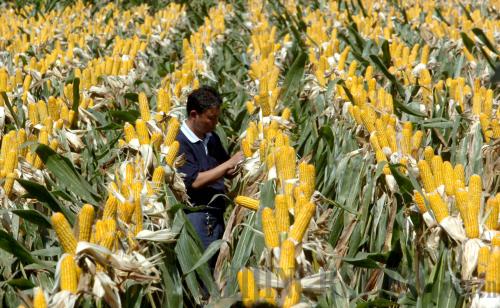|
 |
|
A BATTLEFIELD: A farmer picks corn in Huaxian County, Henan Province. The corn seed industry is recognized as the most fiercely competitive of all seed industries and the one with the biggest potential for development in China (ZHU XIANG) |
Yuan Longping Hi-Tech Agriculture Co. Ltd. (Longping Hi-Tech), named after the father of hybrid rice in China, announced on February 10 the establishment of a joint venture (JV) with a subsidiary of Vilmorin & Cie.
The two parties will set up a JV in China to research, produce and sell the seeds of hybrid corn, wheat and oil-bearing plants. Longping Hi-Tech will invest 120 million yuan ($18.21 million) for a 60 percent stake in the JV. Vilmorin Hong Kong Ltd., a subsidiary of Vilmorin & Cie, will invest 80 million ($12.4 million) for a 40 percent stake. The two parties also agreed to transfer 5 percent of stake to the management team of the JV. The establishment of the JV is subject to government approval.
Longping Hi-Tech is a research-oriented agricultural hi-tech company jointly established in June 1999 by the Hunan Academy of Agricultural Sciences (HAAS), the Hunan Hybrid Rice Research Center and Yuan Longping, a member of the Chinese Academy of Engineering. In May 2000, Longping Hi-Tech was listed on the Shenzhen Stock Exchange. In December 2004, Hunan Xindaxin Co. Ltd. became the largest shareholder of Longping Hi-Tech after acquiring the shares of HAAS.
In addition to focusing on hybrid rice seeds, Longping Hi-Tech also offers agricultural technology services.
Since 2000, company revenues have grown at an average annual rate of more than 48 percent, with profits growing at an average annual rate of 35 percent. Total assets have grown from less than 200 million yuan ($30.35 million) to 2.1 billion yuan ($318.66 million). Figures released by the Asia and Pacific Seed Association in 2004 show Longping Hi-Tech has become one of the largest seed companies in Asia.
Longping Hi-Tech said in early February, the company's business growth in 2010 was estimated to be 50-70 percent, with net profits reaching 72.7 million-82.4 million yuan ($11.03 million-$12.5 million), in comparison with 48.47 million yuan ($7.36 million) for the previous year.
Vilmorin & Cie is mainly engaged in the vegetable and field grain seed business. France's Groupe Limagrain, the world's fourth largest seed company and listed on the Paris stock exchange, owns 72 percent of Vilmorin & Cie's shares. Vilmorin Hong Kong Ltd. is a holding subsidiary of Vilmorin & Cie and is registered in Hong Kong.
After the JV is established, Longping Hi-Tech is expected to be the operating platform for Groupe Limagrain in China. The latter will offer its advantages in research and development, as well as marketing experience in hybrid corn seeds, to the former.
Seeking breakthroughs
In China, corn is the second most important grain crop after rice. Corn accounts for 22 percent of total sowing area and 25 percent of total output devoted to grain crops in China. According to the Ministry of Agriculture, during the period of
2003-07, growth in corn output represented more than 44 percent of the country's total grain growth, ranking first among grain crops. Accordingly, more land is allotted to corn than other grain crops, and the market demand for corn seeds is quite large. Since the gross profit rate for corn seeds is higher than that of other field grain seeds, various seed companies are attracted to this industry. As a result, the corn seed industry now has the fiercest competition of all seed industries.
Tong Pingya, researcher at the Institute of Crop Breeding and Cultivation of the Chinese Academy of Agricultural Sciences (CAAS), said 90 percent of China's seed companies are in the corn seed business. But, the industry is not highly concentrated. Large companies represent 30 percent of industry sales, while the remainder is thinly spread among a large number of small and medium-sized companies. According to figures released by CAAS, 110 million kg of corn seeds were sold in China in 2009, with total sales of 5 billion yuan ($758.73 million).
| 